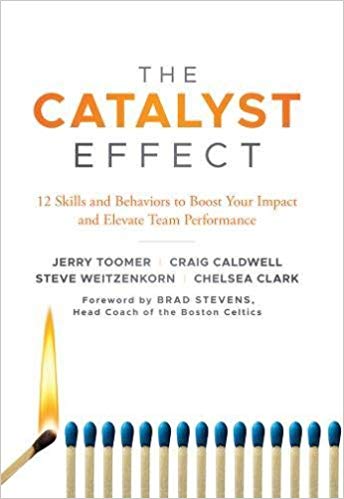At 45, I decided to give up my teaching job and enroll in a journalism course. My first pitch landed me a short documentary for national radio.
My producer was young and dynamic, and my inner “you’re not good enough” voice kicked in with a vengeance. Yet, from the get-go, Alexis believed in my ability to succeed.
He encouraged me, showed constant optimism, and gave me tips for improving my interview technique. But what he never did was take over, even when I made mistakes.
Alexis’s confidence in my ability has bolstered me to this day. Now, after reading Jerry Toomer’s new book, “The Catalyst Effect: 12 Skills and Behaviors to Boost Your Impact and Elevate Team Performance,” I recognize that Alexis was a catalyst.
He showed me that anyone, in any position within an organization, can use leadership qualities to inspire others to produce their best work.
Empower Your People
Like those unassuming materials in science that serve only to accelerate a reaction in others, Alexis didn’t seek the limelight for himself.
Instead, he unselfishly gave me the benefit of his commitment and expertise. He allowed me to make and correct my own mistakes. In doing so, he empowered me to become a better journalist.

Alexis’s enthusiasm and “can-do” attitude were contagious. He inspired me to believe wholeheartedly in my project – work that I still consider to be one of my best pieces of journalism.
Since then, I’ve monitored my own positivity. Whether I’m pitching for work, teaching, or at home with family, I know that enthusiasm and optimism create the sparks that fire brilliant outcomes.
Opportunities for Learning
My brother calls me “Miss Curious.” I drive him mad with my constant questions. But that’s another characteristic of catalytic behavior.
Catalysts are innately curious. They see opportunities for learning everywhere. Not just in formal training, but in everyday work and life.
This “hunger to know” means that catalysts continually upgrade their knowledge and skills, which they then share with others. So my curiosity isn’t such a bad thing after all!
Own Your Achievements
From 30 years of teaching, I’ve also learned that “spoon-feeding” holds people back in the long term. So it’s great to have this confirmed by the authors’ research.
Guiding, enabling, facilitating – as a parent, leader or trainer – empowers the person who’s learning. Crucially, though, learners must do the work themselves and “own” their achievement. Doing that means you’ll carry this confidence into your next challenge.
Another fundamental aspect of the catalyst effect is recognizing the impact that we have on others. Catalysts excel at identifying and sharing their emotions, as well as reading other people’s feelings. They are also known for showing empathy. This helps them to gain credibility and make meaningful connections.
Empathy and Emotional Intelligence
To be honest, I’m not very good at emotional intelligence. I tend to think that others feel the same way as I do about a situation. But I’m taking on board Daniel Goleman’s belief that only through self-awareness can we start to understand other people’s feelings and make the connections we need.
So recognizing what you need to do to increase your empathy is a good start. It can be quite comforting to float along in the same routine, working toward familiar goals. That’s fine.
But, if you’re like me, you’re always seeking new challenges, different goals, striving to achieve more. However, this can be very tiring, and I have to rein myself in sometimes to prevent burnout.
From “The Catalyst Effect,” I’ve learned to choose carefully how I spend my time and energy. Mainly by asking myself questions like: how is what I’m doing getting me closer to my overall objective?
The Road to Success
This has led to me drop some social media. It was time-consuming and showed little return. Instead, I’m focusing on attending a writing group, where I learn new skills and get valuable feedback.
Some might say it’s a no-brainer that people with focus, optimism, belief in others, and enthusiasm have a positive effect on everyone.
I agree. Of course, though, it’s not as easy in practice as it sounds. We all have times when we lose our way. Like when we don’t want to work with someone we find difficult, or we can’t seem to find our motivation.
But this book provides a road map to becoming a catalyst every single day – even when the going gets tough. After all, the road to success is always under construction.
Buy the Book or Download Our Review
If you want to read more of “The Catalyst Effect” for yourself, you can buy the ebook from the Mind Tools store.
We review the best new business books and the tested classics in our monthly Book Insight for the Mind Tools Club.
If you’re a Club member or enterprise licensee, you can download or stream the “The Catalyst Effect” Book Insight review in text or audio format.
And if you haven’t already signed up, join the Mind Tools Club and gain access to all 2,400+ resources, including approximately 400 Book Insights. For a corporate solution, take a look at our Mind Tools for Business site.
What’s your take on The Catalyst Effect? Join the discussion below!




Comments
Lisa Michelle Brown says
3 years ago"The road to success is always under construction." Brilliant - and a perfect way to express my innate optimism. I will keep this in mind next time that optimism begins to elude me. Thank you!
Sarah Harvey says
3 years agoThat’s great Lisa! I like that quote too and had not come across it before.
Sarah,
MindTools Team
Sam says
3 years agoThere are "NO DEADENDS" for a Catalyst, they "ALWAYS CREATE A PATH".
Sarah Harvey says
3 years agoSam, that’s a great phrase, isn’t it! “NO DEADENDS” for a Catalyst, they “ALWAYS CREATE A PATH”. I’m loving these ‘road’ metaphors.